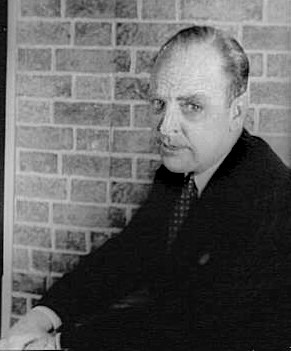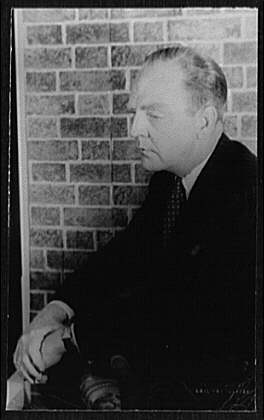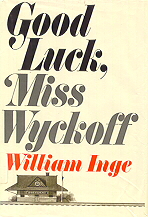William Inge facts for kids
Quick facts for kids
William Inge
|
|
|---|---|

Inge in 1954
|
|
| Born |
William Motter Inge
May 3, 1913 Independence, Kansas, U.S.
|
| Died | June 10, 1973 (aged 60) Los Angeles, California, U.S.
|
| Education | Independence Community College University of Kansas (BA) Vanderbilt University |
| Occupation | Playwright, novelist |
| Years active | 1947–1973 |
William Motter Inge (May 3, 1913 – June 10, 1973) was an American playwright and novelist. In the early 1950s, he became very famous for his plays on Broadway. His play Picnic even won him a special award called the Pulitzer Prize. Inge was known as the "Playwright of the Midwest" because his stories often showed life in small towns in the American heartland.
Contents
William Inge's Early Life and Education
William Inge was born in Independence, Kansas. He was the fifth child of Maude Sarah Gibson-Inge and Luther Clay Inge. He went to Independence Community College and then to the University of Kansas. In 1935, he earned a degree in Speech and Drama.
After college, Inge moved to Nashville, Tennessee, to study more. He later worked as a laborer on state highways. He also announced news in Wichita. From 1937 to 1938, he taught English and drama at a high school in Columbus, Kansas. He then taught at Stephens College in Columbia, Missouri, from 1938 to 1943.
William Inge's Career as a Playwright
In 1943, Inge started working as a drama critic for a newspaper. A famous writer named Tennessee Williams encouraged him to write his own plays. Inge wrote his first play, Farther Off from Heaven, in 1947. It was performed in Dallas, Texas.
While teaching at Washington University in St. Louis, Inge wrote Come Back, Little Sheba. This play was a big success on Broadway in 1950. It ran for 190 shows and won Tony Awards for its main actors. Later, in 1952, a film version of the play was made. The film also won awards for its star, Shirley Booth.

In 1953, Inge won the Pulitzer Prize for his play Picnic. He said the play was inspired by women he knew as a child. His mother ran a boarding house, and three school teachers lived there. He noticed the sadness and emptiness in their lives, which touched him. Picnic was very popular on Broadway from 1953 to 1954. A movie based on Picnic was released in 1955 and won two Academy Awards.
Inge's short play Glory in the Flower was shown on TV in 1953. It starred famous actors like Hume Cronyn and James Dean.
In 1955, his play Bus Stop opened. Inge got the idea for this play from a real situation he saw on a bus trip. The play was nominated for four Tony Awards. In 1956, it was made into a movie starring Marilyn Monroe.
In 1957, Inge wrote The Dark at the Top of the Stairs. This play was an expanded version of his earlier work. It was nominated for five Tony Awards and became a movie in 1960.
His play Natural Affection opened in 1963 during a newspaper strike. Because of this, not many people knew about the play, and it only ran for 36 shows. However, a successful new production of Natural Affection was performed in Chicago in 2005. It was even named one of the best plays of the year by a newspaper.
Inge's play The Last Pad first appeared in Phoenix, Arizona, in 1972. It starred Nick Nolte, who later became a famous film actor. The play was praised as the Best Play of 1972 in Phoenix.
After Inge passed away, his play Summer Brave was performed on Broadway in 1975. This play was Inge's own new version of Picnic. He felt it was more true to his original ideas for the story.
Many of Inge's unperformed plays started getting attention in 2009. These plays are kept at Independence Community College. Some of them have been read or performed in New York City and at the William Inge Theater Festival in Kansas.
William Inge's Work in Television and Film
In 1961, Inge won an Academy Award for his movie screenplay Splendor in the Grass. This was for Best Writing. He also appeared briefly in the film as a reverend. He wrote the screenplay for All Fall Down (1962).
Inge was the script supervisor for the Bus Stop TV series in 1961–62. This show was based on his play. It featured stories about people who passed through a bus station diner in a made-up Colorado town.
In 1964, Inge wrote a play for TV called Out on the Outskirts of Town. It was shown on NBC and starred Anne Bancroft and Jack Warden. Inge himself played the role of the town doctor in this show.
William Inge's Novels
William Inge also wrote two novels. Both of his novels are set in a fictional town in Kansas called Freedom.
His first novel, Good Luck, Miss Wyckoff (1970), explores themes of unfair treatment and public shame. A film version of this book was made in 1979.
His second novel, My Son Is a Splendid Driver (1971), tells the story of the Hansen family. This book is based on parts of Inge's own life.
In his later years, Inge lived in Los Angeles and taught playwriting. His last few plays did not receive much attention. He became very sad, thinking he would not be able to write well again.
William Inge's Death and Lasting Impact
William Inge passed away on June 10, 1973, at his home in Hollywood. He was 60 years old. He is buried in his hometown of Independence, Kansas.
Inge has a star on the St. Louis Walk of Fame, which honors famous people.
After his plays and movies became successful, Inge became wealthy. He bought many modern art pieces. He donated ten of these paintings to the Nelson Gallery in Kansas City, Missouri.
A special theater at the University of Kansas is named after William Inge. It is called a black box theater.
In 1979, William Inge was added to the American Theater Hall of Fame.
Since 1982, Independence Community College has held the annual William Inge Theatre Festival. This festival honors playwrights. The college also has a large collection of Inge's works, including his writings, films, and letters.
William Inge's Works
Plays
- 1950: Come Back, Little Sheba
- 1953: Picnic
- 1955: Bus Stop
- 1957: The Dark at the Top of the Stairs
- 1959: A Loss of Roses
- 1962: Summer Brave (a new version of Picnic)
- 1963: Natural Affection
- 1966: Where's Daddy?
- 1973: The Last Pad
- Off the Main Road
Short plays
- To Bobolink, for Her Spirit
- People in the Wind
- A Social Event
- The Boy in the Basement
- The Tiny Closet
- Memory of Summer
- Bus Riley's Back in Town
- The Rainy Afternoon
- The Mall
- An Incident at the Standish Arms
- The Strains of Triumph
- 1953: Glory in the Flower
- The Killing
- The Love Death
- The Silent Call
- Bad Breath
- Morning on the Beach
- Moving In
- A Murder
Film and TV
- 1952: Come Back Little Sheba
- 1955: Picnic
- 1956: Bus Stop
- 1960: The Dark at the Top of the Stairs
- 1961: Splendor in the Grass
- 1963: All Fall Down
- 1964: Out on the Outskirts of Town (a new version of Off the Main Road)
- 1965: Bus Riley's Back in Town (as Walter Gage)
Novels
- 1970: Good Luck, Miss Wyckoff
- 1971: My Son Is a Splendid Driver
See also
 In Spanish: William Motter Inge para niños
In Spanish: William Motter Inge para niños
 | James Van Der Zee |
 | Alma Thomas |
 | Ellis Wilson |
 | Margaret Taylor-Burroughs |


